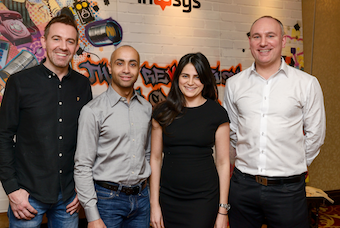 Call management company Invosys has acquired VoIP platform developer Telux HD. The move sees the integration of Invosys's cloud-based Number Manager portal with Telux's open source cloud communications platform. The Number Manager portal enables customers to configure, manage and monitor their call management solutions. The service will form part of a new channel offering called Invosys Hosted and incorporate cloud-based telephony.
Call management company Invosys has acquired VoIP platform developer Telux HD. The move sees the integration of Invosys's cloud-based Number Manager portal with Telux's open source cloud communications platform. The Number Manager portal enables customers to configure, manage and monitor their call management solutions. The service will form part of a new channel offering called Invosys Hosted and incorporate cloud-based telephony.
"Instead of reselling hosted from one of the legacy suppliers we wanted to launch a hosted product to integrate with Number Manager," said Invosys CEO Rob Booth.
"Direct access to the owners and developers, swift development and support resolutions along with an open API that means easy and limitless integrations made Telux a clear fit for Invosys.
"The acquisition has allowed us to harness new technology and expand our wholesale channel."
Telux HD co-founder and MD Murray Leach commented: "We have invested heavily in developing our VoIP technology and we share Invosys's ambitious plans to capitalise on the impending changes to the voice market in the UK and beyond."
Invosys co-founder Peter Crooks added: "Invosys's wholesale channel is already experienced in hosted telephony, so we know our offering needs to be commercially viable while including access to features and services not currently available from our competitors.
"With support from Telux we've created something in line with our philosophy of devising feature rich services that are simple to set up, easy to use and priced competitively. Ultimately, we believe that Invosys Hosted can shake the market up and become an important part of what we do."
Telux remains at its Manchester city centre offices and the two companies will continue to operate as separate entities.
Pictured above (l-r): Rob Booth, Murray Leach, Rosie Moth (Telux) and Peter Crooks

 The 2017 edition of Nimans' free Trade Catalogue contains 484 pages and details over 7,000 products. A key feature of this year's publication is an expanded data infrastructure range along with new system developments and headset innovations including a convertible two-in-one Radius model.
The 2017 edition of Nimans' free Trade Catalogue contains 484 pages and details over 7,000 products. A key feature of this year's publication is an expanded data infrastructure range along with new system developments and headset innovations including a convertible two-in-one Radius model. Call management company Invosys has acquired VoIP platform developer Telux HD. The move sees the integration of Invosys's cloud-based Number Manager portal with Telux's open source cloud communications platform. The Number Manager portal enables customers to configure, manage and monitor their call management solutions. The service will form part of a new channel offering called Invosys Hosted and incorporate cloud-based telephony.
Call management company Invosys has acquired VoIP platform developer Telux HD. The move sees the integration of Invosys's cloud-based Number Manager portal with Telux's open source cloud communications platform. The Number Manager portal enables customers to configure, manage and monitor their call management solutions. The service will form part of a new channel offering called Invosys Hosted and incorporate cloud-based telephony.